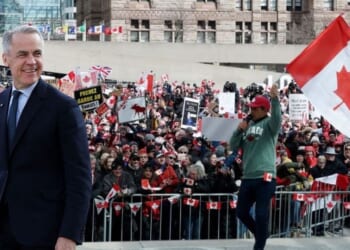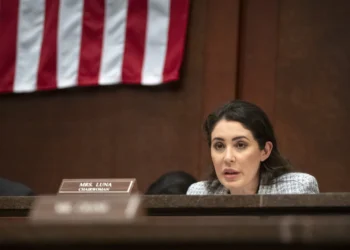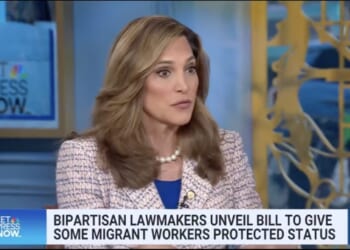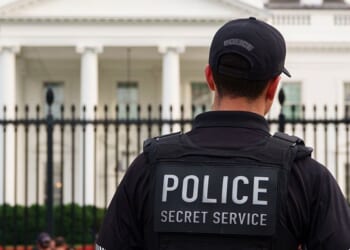After the Senate passed President Trump’s rescission package early Thursday morning that, among other things, clawed back federal funding for PBS and NPR, CBS Mornings teed up an interview it did with NPR CEO Katherine Maher, who claimed the move “would be a tremendous tragedy.”
Co-host Nate Burleson introduced the segment, “Breaking overnight, senators stay up late to vote for major cuts on federal spending on NPR and PBS. Senators slashed spending on foreign aid. In all, the budget cuts amount to around $9 billion. Nikole Killion looks at who will be hit the hardest.”
Nine billion is hardly “major,” but Killion’s report immediately started spinning for public broadcasting as it began with a clip of Elmo saying, “Hi, welcome to Sesame Street.”
Killion herself then introduced Maher, “From PBS to NPR, funding for 1,500 local public radio and television stations nationwide is on the chopping block as the Senate seeks to slash spending in a new White House package. Katherine Maher is the president and CEO of NPR.”
Maher did the usual dishonest trick of trying to claim that NPR is vitally important for disaster awareness, “The primary impact of this potential rescission is going to hurt communities where they need support most, which are rural stations, stations that serve communities that do not have access to other forms of local news, emergency reporting, emergency alerting.”
Killion then sorrowfully asked, “Will local stations have to close?” as Maher answered, “Some will.”
After dueling clips from Sens. Chuck Schumer and Ted Cruz, Killion resumed, “The package eliminates over $1 billion from the Corporation for Public Broadcasting, which funds NPR and PBS, and it cuts roughly $8 billion to foreign aid, including the World Health Organization, UNICEF, and other programs that were part of USAID before it was dismantled, making many of the cuts proposed by Elon Musk’s DOGE team permanent. Maher says the potential cuts come at a challenging time.”
She then asked, “Could this change the landscape or infrastructure of public radio as we know it?”
Maher claimed it would, “I think that this could fundamentally alter public radio as a national service in this country and that – that would be a tremendous tragedy.”
Meanwhile, ABC’s Good Morning America was more straightforward, with reporter Rachel Scott reporting, “This is a package that narrowly passed the Senate. And it was a package that was requested by the Trump administration to claw back money for public broadcasting, as well as about $8 billion in foreign aid. You had two Republican senators that voted against this, Senators Lisa Murkowski and also Susan Collins. This now heads over to the House, George.”
NBC Today anchor Savannah Guthrie was also more matter-of-fact, “The U.S. Senate has approved President Trump’s plan to cut billions of dollars in funding to foreign aid and public broadcasting. 51 to 48 vote and it came early this morning after more than 12 hours of amendments. The package aims to claw back about $1.1 billion from the Corporation for Public Broadcasting, winding down nearly six decades of federal funding, and $7.9 billion in other programs. The bill requires another House vote before it would go to the White House for signature.”
Throughout the recession battle, NPR has defended itself by saying the caricature of it as the outlet for far-left, purple-haired hippies is incorrect and that they are actually the champion of rural communities that vote Republican. However, as recently as Tuesday, NPR was defining Evansville, Indiana—a town of over 115,000 people—as rural just because the nearby towns are considerably less urban. In recent years, Vanderburgh County has modernized its internet services and already has several private radio stations with stronger signals that residents can receive alerts from via Evansville. There is no need for NPR in 2025.
Here is a transcript for the July 17 shows:
CBS Mornings
07/17/25
7:15:14 a.m.
2 minutes and 10 seconds[ON-SCREEN HEADLINE: Breaking Overnight; Major Cuts]
NATE BURLESON: Breaking overnight, senators stay up late to vote for major cuts on federal spending on NPR and PBS. Senators slashed spending on foreign aid. In all, the budget cuts amount to around $9 billion. Nikole Killion looks at who will be hit the hardest.
[ON-SCREEN HEADLINE: Breaking Overnight; Senators Slash Spending; $9 Billion in Cuts to Public Broadcasting and Foreign Aid]
ELMO: Hi, welcome to Sesame Street.
NIKOLE KILLION: From PBS to NPR –
SHREVEPORT, LA NPR ANCHOR JEFF FERRELL: The time is now 8:04.
KILLION: – funding for 1,500 local public radio and television stations nationwide is on the chopping block as the Senate seeks to slash spending in a new White House package. Katherine Maher is the president and CEO of NPR.
KATHERINE MAHER: The primary impact of this potential rescission is going to hurt communities where they need support most, which are rural stations, stations that serve communities that do not have access to other forms of local news, emergency reporting, emergency alerting.
NIKOLE KILLION [TO MAHER]: Will local stations have to close?
MAHER: Some will.
SENATE MINORITY LEADER CHUCK SCHUMER (D-NY): Why is Donald Trump so hellbent on taking away funding from local stations?
SENATOR TED CRUZ (R-TX): NPR and PBS revealed their left-wing bias time and time again.
KILLION: The package eliminates over $1 billion from the Corporation for Public Broadcasting, which funds NPR and PBS, and it cuts roughly $8 billion to foreign aid, including the World Health Organization, UNICEF, and other programs that were part of USAID before it was dismantled, making many of the cuts proposed by Elon Musk’s DOGE team permanent. [KEYBOARD TYPING] Maher says the potential cuts come at a challenging time. [TO MAHER] Could this change the landscape or infrastructure of public radio as we know it?
MAHER: I think that this could fundamentally alter public radio as a national service in this country and that – that would be a tremendous tragedy.
KILLION: There were a few changes made to this bill to preserve funding for stations in tribal areas and to exempt global health funding to combat HIV and AIDS. That means this has to go back to the House for another vote by the end of the week, where some conservatives would like to see even deeper reductions, Gayle.
GAYLE KING: Alright, Nikole, got it. Thank you very much.
***
ABC’s Good Morning America
07/17/25
7:11:22 a.m.
26 seconds[ON-SCREEN HEADLINE: Senate Approves Cuts to Foreign Aid, Public Broadcasting]
GEORGE STEPHANOPOULOS: And, action in the Senate overnight, they approved President Trump’s cuts for public broadcasting and foreign aid?
RACHEL SCOTT: Yeah, George. This is a package that narrowly passed the Senate. And it was a package that was requested by the Trump administration to claw back money for public broadcasting, as well as about $8 billion in foreign aid. You had two Republican senators that voted against this, Senators Lisa Murkowski and also Susan Collins. This now heads over to the House, George.
***
NBC’s Today
07/17/25
7:01:03 a.m. [TEASE]
6 secondsCRAIG MELVIN: Overnight, an early morning vote in the Senate pushing through deep cuts to everything from federal aid to public broadcasting.
(….)
7:10:56 a.m.
30 seconds[ON-SCREEN HEADLINE: Senate Approves Trump’s Funding Cuts Package]
SAVANNAH GUTHRIE: The U.S. Senate has approved President Trump’s plan to cut billions of dollars in funding to foreign aid and public broadcasting. 51 to 48 vote and it came early this morning after more than 12 hours of amendments. The package aims to claw back about $1.1 billion from the Corporation for Public Broadcasting, winding down nearly six decades of federal funding, and $7.9 billion in other programs. The bill requires another House vote before it would go to the White House for signature.















